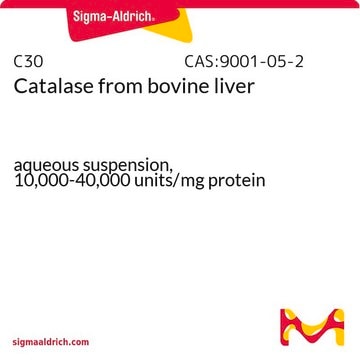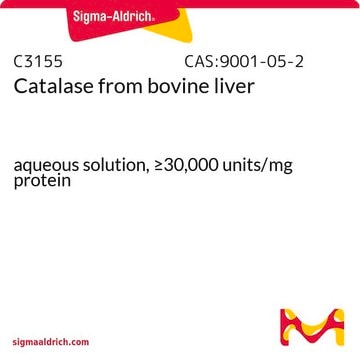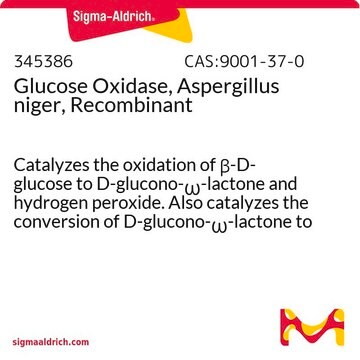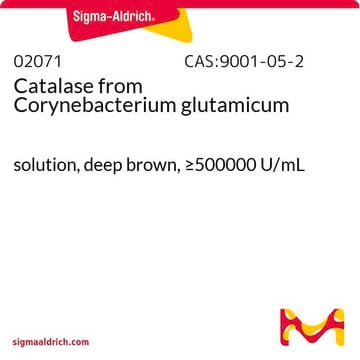C9322
Catalase from bovine liver
lyophilized powder, 2,000-5,000 units/mg protein
Synonyme(s) :
H2O2:H2O2 oxidoreductase
About This Item
Produits recommandés
Source biologique
bovine liver
Niveau de qualité
Forme
lyophilized powder
Activité spécifique
2,000-5,000 units/mg protein
Poids mol.
tetramer ~250 kDa
Point isoélectrique
5.4
Numéro d'accès UniProt
Conditions d'expédition
wet ice
Température de stockage
−20°C
InChI
1S/C9H10O3/c1-2-12-9(11)7-3-5-8(10)6-4-7/h3-6,10H,2H2,1H3
Clé InChI
NUVBSKCKDOMJSU-UHFFFAOYSA-N
Informations sur le gène
cow ... CAT(280743)
Vous recherchez des produits similaires ? Visite Guide de comparaison des produits
Description générale
Catalase from bovine liver is a tetramer consisting of 4 equal subunits each with a 60 kDa molecular weight. Each of these subunits contains iron bound to a protoheme IX group. The enzyme will also strongly bind to NADP, where NADP and the heme group are within 13.7 angstroms.
Application
Catalase from bovine liver may be used:
- to prepare H2O2-O2 based biocathode for applications in glucose biofuel cells
- to study the kinetic properties and storage stability of catalase immobilized on to florisil
- in glutathione-mediated superoxide generation in an aqueous solution
Actions biochimiques/physiologiques
Attention
Définition de l'unité
Notes préparatoires
The enzyme is soluble in 50 mM potassium phosphate buffer at 1 mg/mL and pH 7.0.
Stockage et stabilité
Inhibiteur
Mention d'avertissement
Danger
Mentions de danger
Conseils de prudence
Classification des risques
Resp. Sens. 1
Code de la classe de stockage
11 - Combustible Solids
Classe de danger pour l'eau (WGK)
WGK 1
Point d'éclair (°F)
Not applicable
Point d'éclair (°C)
Not applicable
Équipement de protection individuelle
Eyeshields, Gloves, type N95 (US)
Certificats d'analyse (COA)
Recherchez un Certificats d'analyse (COA) en saisissant le numéro de lot du produit. Les numéros de lot figurent sur l'étiquette du produit après les mots "Lot" ou "Batch".
Déjà en possession de ce produit ?
Retrouvez la documentation relative aux produits que vous avez récemment achetés dans la Bibliothèque de documents.
Les clients ont également consulté
Articles
Cellular oxidative stress is countered by enzymatic scavengers and antioxidant modulators against reactive oxygen species damage.
Cellular oxidative stress is countered by enzymatic scavengers and antioxidant modulators against reactive oxygen species damage.
Cellular oxidative stress is countered by enzymatic scavengers and antioxidant modulators against reactive oxygen species damage.
Cellular oxidative stress is countered by enzymatic scavengers and antioxidant modulators against reactive oxygen species damage.
Protocoles
This procedure may be used for all Catalase products.
Notre équipe de scientifiques dispose d'une expérience dans tous les secteurs de la recherche, notamment en sciences de la vie, science des matériaux, synthèse chimique, chromatographie, analyse et dans de nombreux autres domaines..
Contacter notre Service technique












